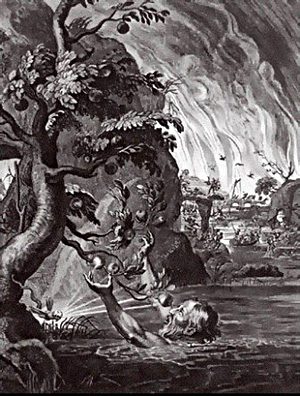Tantalus 2102
 Tantalus was a mythic king of Phrygia, in Greece, one of dozens of Zeus’ illegitimate offspring.
Tantalus was a mythic king of Phrygia, in Greece, one of dozens of Zeus’ illegitimate offspring.
He was once so high in Zeus’ favor that he was a frequent guest on Olympus, and a confidante of the king of the gods. But Tantalus coveted eternal life, and stole the immortality-giving foods ambrosia and nectar, causing Zeus to throw him out. Once more on earth, Tantalus proceeded to violate his father’s trust by revealing some of his most intimate secrets.
To ingratiate himself with the gods again, Tantalus prepared a great banquet to which he invited them. Misreading the situation entirely, he decided to offer his son Pelops as a sacrifice, killed him, cut him into pieces, and boiled him in a stew to serve his divine guests. The gods realized the nature of the proffered dish and refused it, all except Demeter who, distraught at the absence of her abducted daughter Persephone, absent-mindedly ate part of the boy’s shoulder. (Later Zeus ordered the Fates to bring Pelops back to life, and Demeter presented him with a replacement shoulder crafted by Hephaistos, made of ivory.)
This was the final straw for Zeus, who sentenced Tantalus to an eternity of hunger and thirst for his crimes. Chained in Tartarus, in the underworld, Tantalus was placed in a lake with fruit trees hanging overhead. But whenever he attempted to bend down to drink, the waters of the lake receded, and whenever he reached to pick the fruit, a breeze would blow the branches up and out of his reach. Thus his desires were constantly thwarted, always just out of grasp, and he never achieved his purpose. Tantalus was the grandfather of Atreus, and the founder of his House, the members of which feature prominently in tragedies by Aeschylus such as “Seven Against Thebes” and the Orestian Trilogy, including “Agamemnon”. Tantalus has come down to us as the root of our word “tantalize”, meaning “to tease or torment by offering satisfaction but withholding it.”
Astrologically, Tantalus represents teasing and temptation; desires or wants which elude us, are out of reach and unattainable; things which entice, arouse or attract but do not fulfill; and excessive hunger or thirst. There are also connections to cannibalism, and the commission of heinous, taboo or unforgivable crimes.

2 Trackbacks
[…] all, an opposition from TNO Ixion at 7 Sagittarius to asteroid Tantalus at 1 Gemini combines murderous intent (Ixion) with every other power famous for the fee of heinous […]
[…] fulcrum, named for the Egyptian god of the dead, exactly squared Daniel. Also on the fulcrum is asteroid Tantalus, a point noted for the commission of heinous acts, at 17 […]